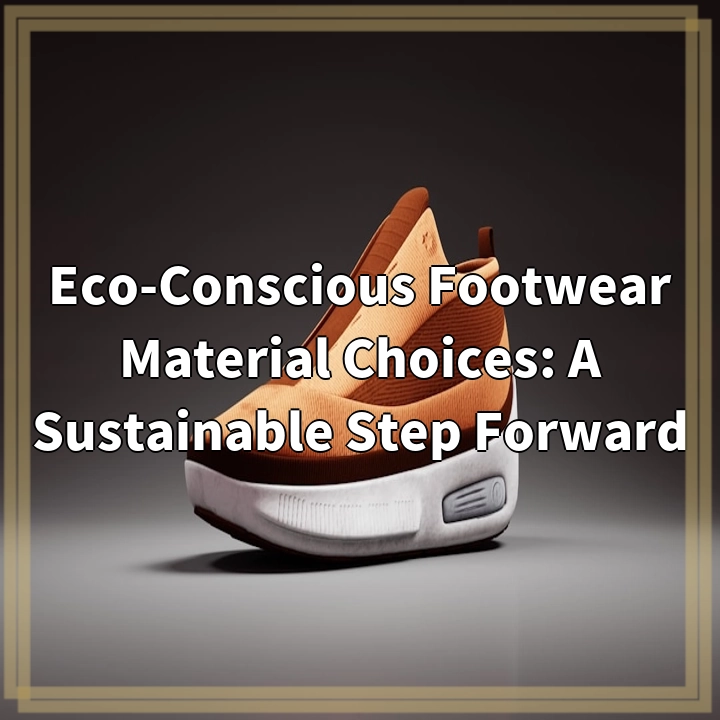
What it is:
Eco-Conscious Footwear Material Choices: A Sustainable Step Forward refers to the movement within the footwear industry to adopt environmentally friendly materials and manufacturing practices. It involves using materials that are sourced sustainably, have a reduced environmental impact, and promote ethical practices throughout the supply chain.
Real-World Problems:
The traditional footwear industry has been associated with numerous environmental and social challenges. Here are some of the real-world problems that eco-conscious footwear material choices aim to address:
1. Environmental Impact:
Conventional footwear production often involves the use of materials derived from non-renewable sources, such as petroleum-based plastics and synthetic leather. The extraction and processing of these resources contribute to greenhouse gas emissions, habitat destruction, and pollution. Eco-conscious materials, on the other hand, focus on using renewable resources and minimizing environmental impact.
2. Chemical Pollution:
Conventional footwear manufacturing involves the use of various chemicals, including dyes, adhesives, and finishing agents. These chemicals can be harmful to both the environment and human health. Eco-conscious material choices prioritize the use of non-toxic and low-impact alternatives, reducing the release of hazardous substances into the environment and minimizing the risk to workers and consumers.
3. Waste Generation:
The footwear industry generates a significant amount of waste throughout the production process, including excess materials and discarded products. Eco-conscious material choices aim to minimize waste through practices such as using recycled or upcycled materials, implementing efficient manufacturing processes, and designing products for durability and recyclability.
4. Social Implications:
The traditional footwear industry has faced criticism for unethical labor practices, including low wages, poor working conditions, and exploitation of workers. Eco-conscious material choices strive to ensure ethical sourcing and production practices, promoting fair wages, safe working conditions, and the preservation of cultural and social values within the communities involved in footwear manufacturing.

Solutions for Eco-Conscious Footwear Material Choices:
Addressing the real-world problems associated with traditional footwear production requires innovative solutions. Here are some key strategies and approaches that promote eco-conscious material choices in the footwear industry:
1. Sustainable Material Sourcing:
Embracing sustainable material sourcing involves using materials that have a lower environmental impact and are sourced responsibly. This includes exploring natural and renewable materials like organic cotton, hemp, and cork, as well as recycled materials like recycled polyester and repurposed rubber. By prioritizing sustainable sourcing practices, the footwear industry can reduce its reliance on non-renewable resources and minimize environmental damage.
2. Designing for Durability and Repairability:
Another important solution is designing footwear with durability and repairability in mind. Ensuring that shoes are built to last reduces waste and supports a more sustainable consumption model. By offering repair services or providing easy-to-find replacement parts, brands can encourage customers to prolong the lifespan of their footwear, reducing the need for constant replacements.
3. Implementing Cleaner Manufacturing Processes:
Reducing the environmental impact of footwear production requires the adoption of cleaner manufacturing processes. This includes minimizing water and energy consumption, implementing recycling and waste management systems, and using non-toxic and eco-friendly chemicals. Brands can also invest in innovative technologies, such as 3D printing, to optimize production efficiency and reduce material waste.
4. Supporting Fair Trade and Workers’ Rights:
To address the social implications of the footwear industry, brands should prioritize fair trade practices and workers’ rights. This involves working closely with suppliers and manufacturers to ensure fair wages, safe working conditions, and the elimination of forced or exploitative labor practices. Collaborating with certifications and organizations that promote ethical labor standards can provide further guidance and accountability.
5. Educating Consumers:
Educating consumers about the importance of eco-conscious footwear material choices is crucial. Brands can raise awareness by transparently communicating their sustainability efforts and the environmental and social benefits of their products. Offering educational resources and promoting sustainable fashion initiatives can empower consumers to make informed purchasing decisions and support brands that align with their values.















